Cote d'Ivoire (Ivory Coast): A Quick Rundown
A Relative Success Story of Dysfunctional Growth Increasing Regional Tensions, French Interference, Cocoa Farmers, & Election Denial
Don't you hate it when people generalize Africa without knowing a thing about a specific country? Let's fix that.
Ivory Coast (Official name: Cote d’Ivoire) is a beautiful, French-speaking country blessed with abundant resources and ~30 million people. Over the past 10 years, Ivorian incomes have doubled, with an average compound annual growth rate of ~7%. It was named “Ivory Coast” by French and Portuguese explorers in the 16th century. As of 2021, among West African nations, Ivory Coast has the 2nd highest living standards in the region. It is a lower middle income country (LMIC) like Morocco, Bangladesh, Vietnam, India, and etc. (Lower-middle income is still poor by Western standards. Adjusted for purchasing power parity of goods & services, the average American salary, is 10x more than Ivorian salaries.) Ivory Coast still doesn’t manufacture as much as those other LMIC countries though. This article is a short exploration of the socio-economical and political history of Ivory Coast.
In terms of inequality by the World Inequality Database, the top 10% live like the richer Latin American countries (Costa Rica & Chile), the middle 40% have similar living standards to their neighbors Ghanaians and the bottom 50% live like poorer Black Africans (Somalis or Sierra Leoneans).
In terms of trade, Ivory Coast imports food, oil, medicine, cars machinery, and electricity mainly from China, France and Nigeria. Eleven percent of the land is arable (land that can be ploughed and used to grow crops) which is used by 40% of the population to grow coffee, palm oil, groundnuts, rubber, and cocoa (the country’s #1 export).
Pre-Colonialism:
Ivory Coast was created by the French at the Berlin Conference in 1884, disregarding ethnic lines. There’s 60+ ethnic groups but you they can be broadly divided as follows: Poorer, Muslim, Mande/Mandinka people live in the Savannah North and richer, Christian, Akan people live in the Tropic South. The south is where most of the crops are grown. Before French colonialization, the North was inhabited by Mandinka people from the collapsed Songhai Empire and its successor, the Kong Empire. There’s also the South-Central inhabiting Bete people, a Mande group that is Christian. The South was ruled by Akan states like the Baoule, the Gyaaman Empire, and the Asante Empire (which conquered the Gyaaman) which also controlled Ghana and Western Togo. Here’s a map showing how empires overlap on different countries:


French Ivory Coast (1893-1960)
In 1886, France crushed the Kong empire, Gyaaman, and Mandinka Empire and created the borders of Ivory Coast.
Ivory Coast was part of French West Africa, and by the early 1950s, Ivory Coast’s economy ranked as one of France’s better colonies, right below French Congo, but better all of French Indochina (Vietnam, Laos, Cambodia). The South of Ivory Coast was more tropical, enabling the colony to be commercially viable for agriculture, especially cocoa and coffee production. The jungle trees also produced really good lumber.
The French had used forced labor (basically slavery, but workers would be “paid” in beads or torn clothes) to use Ivorians to export these products and to construct public works projects. In addition, France tried to make the Ivorians into “evolues” or “Evolved Africans”. The Akan ethnic group, especially the Baoule sub-group, was most amenable group to French values. The Akan converted from paganism to Christianity, while the Muslim Mande people retained Islam.
By 1945 post-WW2, French President Charles De Gaulle allowed colonial representatives a seat in Paris in the Parliament and the first representative, Félix Houphouët-Boigny (FHB) who was the richest Ivorian, made many reforms. Felix ended forced labor in Ivory Coast, negotiated favorable deals for Ivorian & coffee farmers, and fought for political autonomy.
Between 1946-1958, The French government paid 70% of total public investment in Ivory Coast and more than 30% of annual recurring costs were financed by France -creating roads, bridges, schools, and hospitals.
Thanks to Felix and other representatives, colonies became somewhat autonomous “overseas territories” by the late 50s. A new class of Ivorian middle class farmers emerged, and Felix was one of them.
In 1958, Ivory Coast and the other Sub Saharan African colonies were given a vote. They could either remain a nominally autonomous unit in the French Union, or leave the French orbit. Guinea was the sole nation to leave the French Union.
The Prime Minister, Félix Houphouët-Boigny, wanted Ivory Coast to remain an overseas territory of France as long as possible, fearing that Ivory Coast needed more time to be economically viable as a nation-state. After Guinea, Senegal & Mali formed a union to gain independence, then other French African countries followed suit. Felix then followed through with independence anyway by 1960. However, all French colonies (save Guinea), sought French aid, French advisors, and stayed on the CFA franc currency.
First President (1960-1993):
Félix Houphouët-Boigny, elected as the first President, was a Christian & Baoule. He established a capitalist economy (relative to other African countries), but he smashed his country’s democratic constitution and, created a centralized, authoritarian state. He was pro-French and hated the idea of a Pan-African super state that other African leaders were advocating. He leaned on the French military and maintained a significant number of French public servants. While other African countries, Africanized their civilian servants, FHB resisted replacing competent French civil servants with untrained Ivorian bureaucrats.
From 1960-1980, Ivory Coast grew from a low-income to lower-middle income country due to the cocoa and commodity price boom, immigration from skilled French and Lebanese labor, French-owned commerce, and government investment in infrastructure. However, the economic growth created dysfunctional wealth inequality: the Christian South became rich from selling cocoa, pineapples, nuts, wood, and coffee and the Muslim North was still poor. Half of export Ivory Coast’s export revenues came from the south selling cocoa and coffee at the time. Felix established a state-owned marketing board monopoly to collect coffee & cocoa from farmers, paying them a relatively low wage (though higher than what Ghanaian farmers received, since Ghanaian farmers illegally sold cocoa to Ivory Coast for higher prices) and then selling the cocoa on international markets to raise government revenue.
Besides selling soft commodities, Ivory Coast was developing services and subsidized & protected manufacturing industries in petrochemicals, textiles, shoes, and cars.
He tried to diversify the economy, hoping that French Total would find oil, but it wasn’t of significant quantity. Meanwhile, the Muslim North was growing in population due to immigrants from Burkina Faso & Mali and higher birth rates.
When commodities declined in the late 70s-late 90s, Ivory Coast & most of Africa struggled, the state was going bankrupt and sought IMF loans twice, which required fiscal prudence and reduced government programs (which meant that people paid higher out-of-pocket costs for healthcare, and paid tuition for middle school).
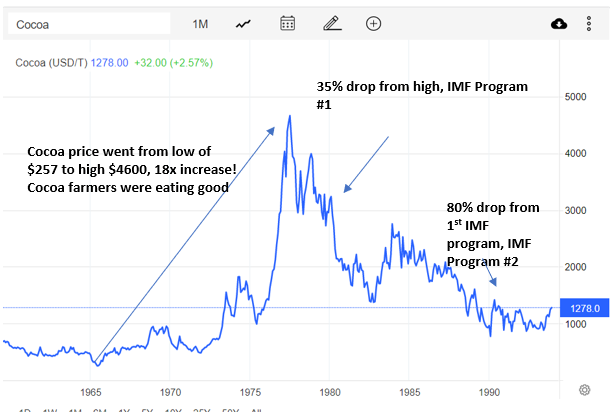

His country needed cash, so he sold state owned firms to French investors, angering locals. In 1997, Ivory Coast sold its state-owned telecom firm to the French company Orange before establishing a proper regulatory or competitive framework. Persuaded by Orange, the government granted it a monopoly over telephone and cellular services. Orange then raised prices significantly, making internet access unaffordable for many, including university students.
American firms tried to break into Ivory Coast, but the French government persuaded Ivory Coast to block competition from American telecom firms.
Weakening cocoa prices, meant less government revenue to subsidize textile, cars, and chemical manufacturing. Less subsidies and poor IMF advice of opening up Ivory industry to international competition too early, eradicated Ivorian manufacturing by 1986. The farmers were suffering due to low prices. In reality, the state-owned marketing board was just squeezing incomes from the farmers, which prevented them from maximizing incomes, amassing savings, and making larger farms.
Since Ivory Coast was the world’s leader of cocoa production, he thought he could influence global cocoa prices. Felix tried to save his economy during the cocoa price collapse by trying to artificially raise prices. He made an artificial price floor of $2 per kg ($1814 per ton) in 1988 and encourage other cocoa producers to join him in creating the Cocoa Producers Alliance, a cocoa OPEC (an international cocoa cartel). Felix invited his country, Ivory Coast, along with Ghana, Gabon, Brazil, Cameroon, Ecuador, Mexico, Nigeria, Peru, Sao Tome, Togo, and Trinidad to try to cartelize the cocoa prices. None of them cared to cartelize or lower production to boost prices. Malaysia, Brazil and Indonesia increased production, Felix never got that price bump he wanted and the cartel was never formed. Why? Besides Ghana, none of these countries depended on Cocoa the same way Ivory Coast did. To everyone else, the cartel was seen as sacrificing foreign earnings to help Ivory Coast.
This diminishing economy led to a massive brain drain of educated Ivorians leaving to Canada or France. To obtain the second IMF loan in the 1990s, the World Bank necessitated democratic reforms. So by 1990, Felix was still president & Ouattara was appointed Prime Minister.
2nd President (1993-1999) & 3rd President (1999-2000):
By 1993, Felix died and another Baoule, Henri Bedie took over as President and a power struggle emerged between President Bedie and Prime Minister Ouattara. Due to commodity price decline, the economy under Bedie was dying. Ivory Coast became low income again. Bedie did not want the former Prime Minister & Muslim Northerner Ouattara to ever be elected. Bedie made bullshit constitutional changes to systemically prevent Northerners from being elected (and created laws saying both parents need to be Ivorian) and made anti-Northern, anti-Mande, anti-Dioula rhetoric called “Ivorite”. In 1999, Bedie was overthrown in a coup by military leader, Robert Guei. Guei tried to remove corruption, get the economy going again, but he lost in an election in 2000, to a Christian Bete, named Gbagbo. During all of this, the “Ivorite” rhetoric continued.
Economically speaking. Ivory Coast hadamassed a huge debt burden under Felix. In the 90s, the government sought a $6.5B debt restructure, and the US Brady Bond deal reduced Ivory Coast’s debt by 80%, but it defaulted in the 2000s due to the civil war.
4th President (2000-2010) + Civil Wars
In 2000, Northerners took to the street because their Ouattara wasn’t allowed to run for office. Gbagbo’s forces killed the Northerners. Northerners rebelled and took control the north of the country. An attempted peace was made in 2003, but it was proven nonsense when Gbagbo and militia groups started killing Northerners with death squads. Eventually Gbagbo’s government accidently attacked French & UN peacekeepers. Corrupt French President who was later jailed, Jacques Chirac, was upset with Gbagbo. Gbagbo said “It was an accident”. Chirac didn’t care what Gbagbo said so he decided to burn down the Ivorian airforce and kill 30+ Ivorians. To many Ivorians, this was seen as France blatantly trying to depose their president with UN backing. So, pro-Gbagbo militias, “Pan-African Youth & Patriots” started to attack French people, French troops, French hotels and burn French houses to wipe out any perception of neocolonialism to say “Screw You Chirac”. By 2010, the civil war ended. Ivory Coast is reunited and Northerners can vote. France, with UN backing, brokered a peace deal and watched the election between Bete Gbagbo vs. Northern Muslim Ouattara vs. Baoule Bedie. Ouattara won with 54%. African Union, France, and the rest of the world recognized Ouattara.
But Gbagbo said the election was null & void due to voter fraud and said many of the Northern votes were from Mali and Burkina Faso (since there are Mandinka people there and they emigrated to Ivory Coast for opportunities.) Another Civil War began. Pro-Gbagbo rebels bomb hundreds of people pro-Ouattara venues, 400K people having been displaced. France says enough is enough, France aided the Northern forces to storm the capital to kick out Gbagbo. Despite the civil wars, the Ivorian economy was still growing, and it became lower-middle income again. This is mainly due to the fact that the CFA franc is anchored to the euro, so even if European investor confidence drops in Ivory Coast, the value of the CFA franc to the euro is maintained.
2010- Present, Ouattara
After 27 years of political nonsense, a coup, 2 civil wars, with French & UN intervention, Ouattara is finally president. Unfortunately due to the civil wars, he came into office defaulting on a $29M payment on its bond.
Cocoa prices up:
However, Ouattara came to office at a good time, cocoa prices have soared from $2200 in 2012 to $3400 per ton in 2023. In May 2024, the cocoa price is over $8000!. In addition, Ouattara consolidated many government-owned marketing boards into a central agency, the Cafe Cacoa Council (CCC) and increased the farmers’ share of the cocoa prices.
Thanks to both corporations and government policy from Gbagbo and Ouattara, Ivory Coast has started to process cocoa. Between 2000 to 2012, Ivorian cocoa grindings have almost doubled from ~230K metric tons to 450K metric tons. Below you’ll see how much better Ivorian firms are at value-addition & production to cocoa than Ghana is:
Debt Relief:
The rises in cocoa and economic growth helped Ivory Coast pay its debt payments. But also by 2012, Ouattara signed up for the World Bank’s “Heavily Indebted Poor Countries Initiative”. By following the IMF’s neoliberal policy prescriptions, The World Bank & IMF erased $4B of Ivorian debt.
Eurobond Borrowing:
After debt relief, Ouattara then went out to the eurobond market for more government borrowing. He received loans from private investors in 2014, 2015 ,2017, 2018, and 2019. In each one of these loans, he uses new loans to pay back the old loan and use the remaining proceeds to execute new government projects. This “Ponzi scheme euroborrowing” is risky because the strategy fails when no one wants to lend to you, but so far, it is working for Ivory Coast. Ivory Coast’s credit rating went from “default" in 2011 to BB- in 2023, the same rating South Africa has.
Selling State Owned Firms: He has sold stakes in government owned businesses and used the proceeds to make new roads and other infrastructure.
Relations with China:
Lastly, Ouattara has opened up significantly to Chinese investment & trade. Ivory Coast is a member nation of the Belt and Road Initiative. As of 2022, China has invested $7.5B in Ivory Coast and lent $3B to Ivory Coast (~4% of Ivory Coast’s $70B GDP as of 2022), mainly in infrastructure projects winning major building contracts. This has helped Ivory Coast finance projects like:
The expansion of the Port of Abidjan, a $934M project, helping Ivory Coast become a regional trade hub. The project is financed by China’s Export-Import Bank.
As a result of improved relations between Ivory Coast and China, in 2021, Ivory Coast has imported $3B of Chinese clothes, machines, metal products, vehicles, food, shoes and etc. Meanwhile, Ivory Coast has been providing $300M in Rubber, $100M in crude oil, and $100M in manganese. China brings manganese ore from Ivory Coast to China, and then China processes the manganese, where China has a near monopoly on refining the commodity. Manganese is a crucial mineral to make electric vehicles, electric rechargeable batteries and etc. Teslas and Battery Powered Volkswagens would not exist, unless China dug manganese from South African, Gabonese, Australian, Brazilian, Ghanaian, and Ivorian dirt (These are the top 6 manganese ore producers in order). Ivory Coast contributes to China producing 90% of the world’s manganese products.
Ouattara has just won his 3rd term in office, which was controversial and minor protests broke out. Overall, I am very optimistic about Ivory Coast. Most African economies have been suffering a lost decade since 2014, with almost no growth at all in living standards. Countries like Nigeria, South Africa, Angola, Namibia peaked in the early to mid 2010s, while Ivorian incomes have continued to rise, demonstrating that Ivorian growth isn’t dependent on resource booms as it was in the 1970s.
Conclusions
Cocoa dependence has damaged Ivory Coast in the past. As people’s living standards plummeted the moment cocoa prices plunged. Thankfully, Ivory Coast is not as dependent on selling raw cocoa as it was in the past.
IMF loans, despite giving the needed capital, puts intense structural change in the government’s policies which restrict the solutions that African leaders can implement.
Authoritarian & Democratic countries are unstable for different reasons. Authoritarian countries have issues due to the succession crisis problem. After the Charismatic, and Founding Father, Felix Houphouet Boigny died, Ivory Coast turned to regionalist, tribalism. The issue with democracy is due to the issue of competing interests - Rich Christian South vs. Poor Muslim North.
____________________________________________
Note: As of July 2023, we now have Ivory Coast’s latest income per person numbers from the World Bank: At current exchange rates, the average Ivorian makes $2620 a year, a 6% increase from 2021 ($2470 per year). Ivory Coast just surpassed the Southeast Asian nation Laos.
Sources:
Tagged in hyperlinks
The book: Cote d’Ivoire, a country study
https://www.brookings.edu/opinions/what-next-for-ivory-coast/
African Development Bank Group data: https://www.afdb.org/fileadmin/uploads/afdb/Documents/Project-and-Operations/ADF-BD-IF-2006-37-EN-COTE-DIVOIRE-PCR-MACRO-ECONOMIC-AND-STRUCTURAL-ADJUSTMENT-PROGRAMME-1994-1996_.PDF
"The Impacts of the World Bank and IMF Structural Adjustment Programmes on Africa: The Case Study of Cote D'Ivoire, Senegal, Uganda, and Zimbabwe".


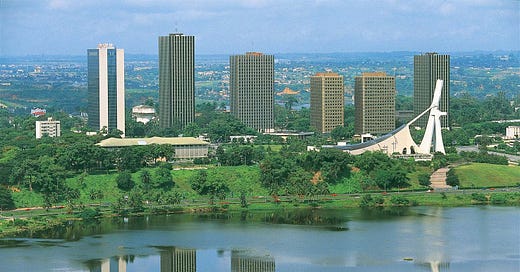





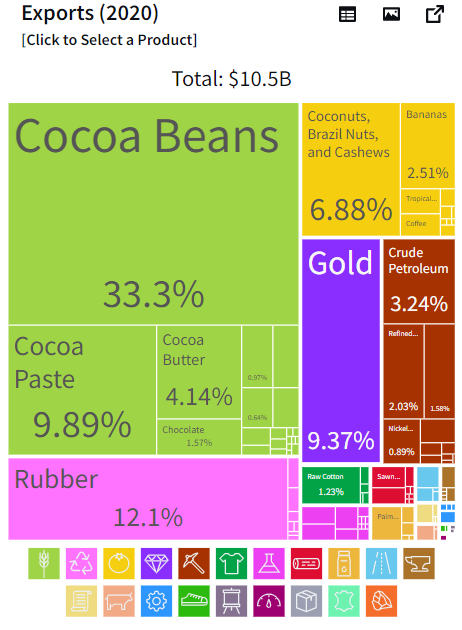



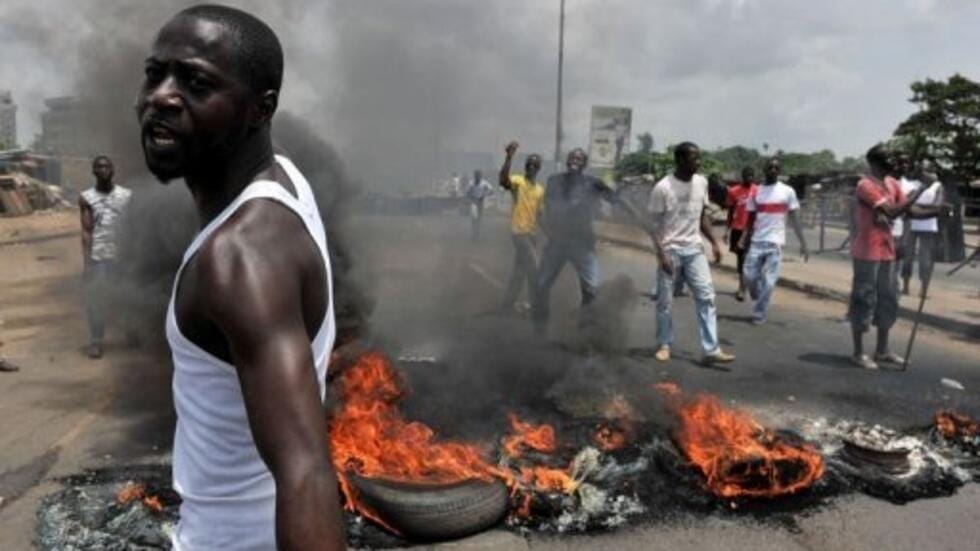

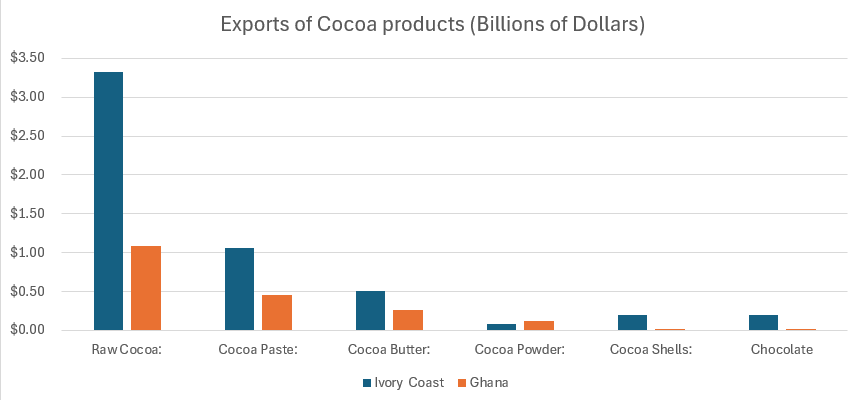
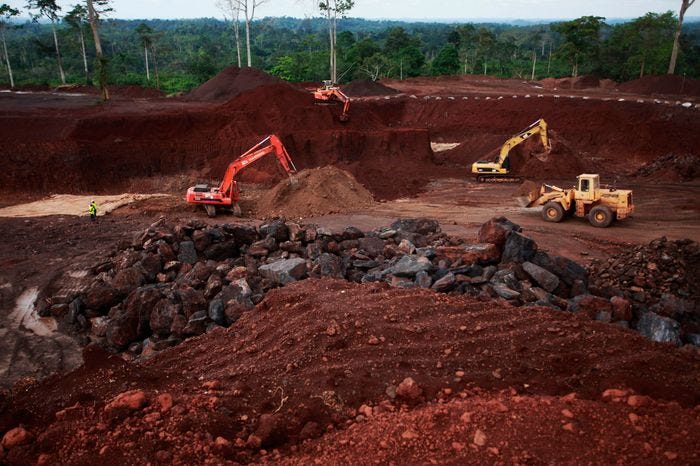
It’s very helpful when you put the economic numbers into categories to show comparative statistics to nations in other parts of the world. It helps with perspective. Thanks.
Great job!